Imagine it’s nighttime, and you hear your dog making howling sounds. You might wonder if your dog found a raccoon or a squirrel outside. So, you get up to check, but then you realize that your dog is actually howling in its sleep. Sometimes, it might even let out a little bark or move its paws.
But when your dog howls at night while asleep, you might start to worry. Is this normal? What does it mean when dogs howl in their sleep?
Most dogs howl in their sleep simply because they are dreaming. A dog who howls in his sleep is usually experiencing an unpleasant dream, accompanied by barks and growls.
In this blog post, we will discuss what does it mean when your dog howls in his sleep and provide tips that help to stop dogs howling in sleep.
What Does It Mean When My Dog Howls In His Sleep?
Dogs, like humans, can sometimes make noises and movements in their sleep. It might be because they are having a dream. Howling during sleep doesn’t necessarily indicate any problems.
However, if your dog’s howling during sleep becomes very frequent or is accompanied by other unusual behaviors when awake, it could be a good idea to consult with a veterinarian to rule out any underlying issues. Otherwise, enjoy watching your furry friend have his dream adventures!
Why Does My Dog Howl In His Sleep? (9 Reasons)
dogs howling in their sleep for a variety of reasons, much like humans may talk or move in their sleep. Some possible explanations for why did my dog howl in his sleep include.
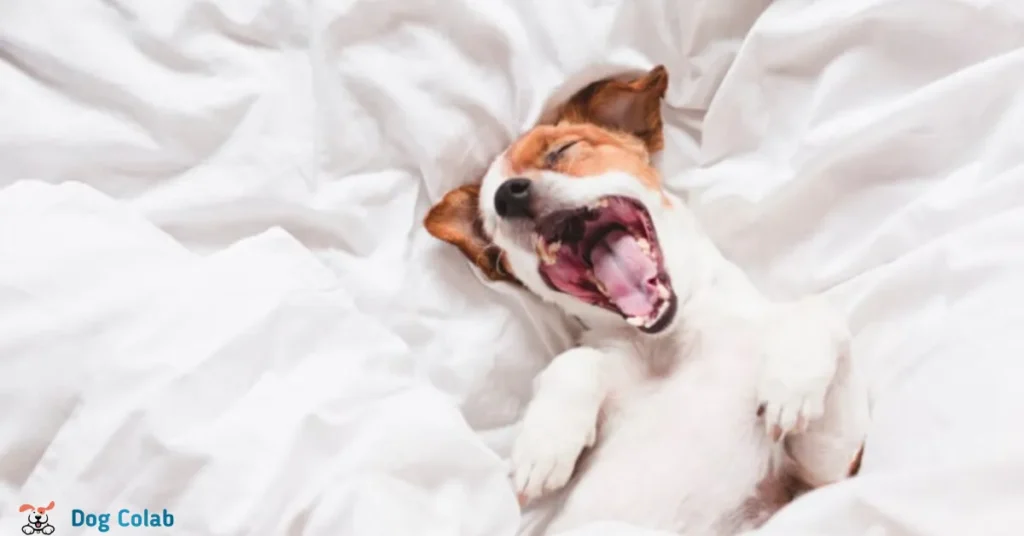
1. Dreaming
Like humans, dogs go through different sleep cycles, including REM (rapid eye movement). During REM sleep, dogs are more likely to have vivid dreams. These dreams can be a reflection of their daily experiences, interactions, and even their instincts. If your dog is howling in his sleep, it may simply be a response to something he’s experiencing in his dream world.
2. Communication
Howling is a natural form of communication for dogs. In the wild, wolves and other canids use howling to communicate with their pack members over long distances. When your dog howls in his sleep, it might be an instinctual response triggered by a dream that involves communication with other dogs or animals.
3. Inherited Behavior
It is common for some dog breeds to howl more than others. Breeds like Huskies, Alaskan Malamutes, and Beagles are known for their vocal tendencies. This propensity to howl can also extend to their dreams. If your dog belongs to one of these breeds, he may be more likely to howl in his sleep due to his genetic predisposition.
4. Environmental Triggers
Even when asleep, dogs can be sensitive to external stimuli. If your dog hears distant sirens, other dogs barking, or even a high-pitched sound while he’s asleep, it may trigger a howling response. This is similar to how they might react when awake but in a more subdued manner.
5. Emotional Expression
Another reason why do dogs howl at night is due to emotional expression. Dogs often use howling to express their emotions, including excitement, loneliness, or anxiety. When your dog is dreaming, he may be processing his emotions, and this can manifest as howling. It’s possible that he’s reliving a moment from the day when he felt a strong emotion.
6. Medical or Physical Issues
If the howling during dog sleep is a sudden or frequent occurrence and is accompanied by other symptoms like restlessness, twitching, or difficulty breathing, it could be a sign of an underlying medical issue, such as seizures or pain.
7. Age and Development
Puppies and young dogs may be more prone to howling in their sleep as they undergo rapid growth and development. Just like human babies, puppies often have active dream states, and their vocalizations can be more frequent. As your dog matures, the intensity and frequency of sleep howling may decrease.
8. Reactivity
Some dogs are more reactive to their surroundings than others. If your dog is highly alert and responsive when awake, he may continue to react to stimuli in his dreams. This heightened reactivity could result in vocalizations such as howling during sleep.
9. Unresolved Issues
Dogs can carry unresolved emotions or experiences into their dreams. If your dog has encountered something stressful, exciting, or puzzling during the day, he may revisit that scenario in his dreams, and it could lead to vocalizations like howling.
Is Howling in Sleep Normal?
Yes, it’s normal for a dog to howl in their sleep occasionally. This behavior is similar to how humans might talk or move during their dreams. Dogs have active dream cycles, just like people, and these dreams can trigger vocalizations.
Is a Dog Happy When It Howls?
A dog’s happiness or emotions during howling can vary depending on the context. While some dogs may howl when they’re happy, others may howl for other reasons.
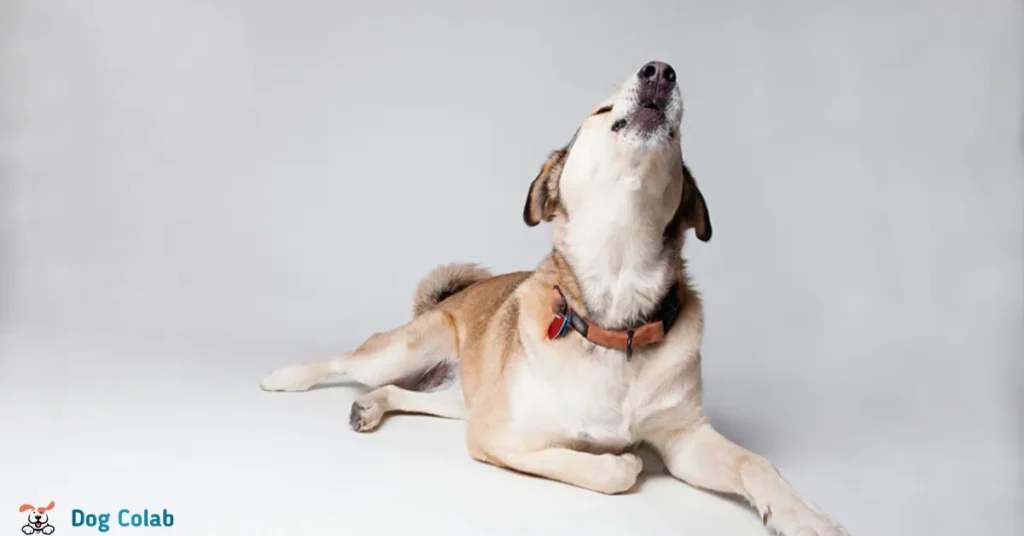
So, it’s essential to consider the overall context and your dog’s behavior when trying to determine their emotional state during howling. If your dog seems happy, relaxed, and content in general, occasional howling may not be a cause for concern.
Read More:- Should dog sleep with his collar on.
Should I Be Worried If My Dog Howled In His Sleep?
If your dog occasionally howls in their sleep, there’s generally no need to be overly worried. However, if your dog’s howling in their sleep becomes frequent, intense, or seems distressing, it might be worth paying closer attention to. Excessive or distressing howling during sleep could potentially be a sign of an underlying issue, such as anxiety or discomfort.
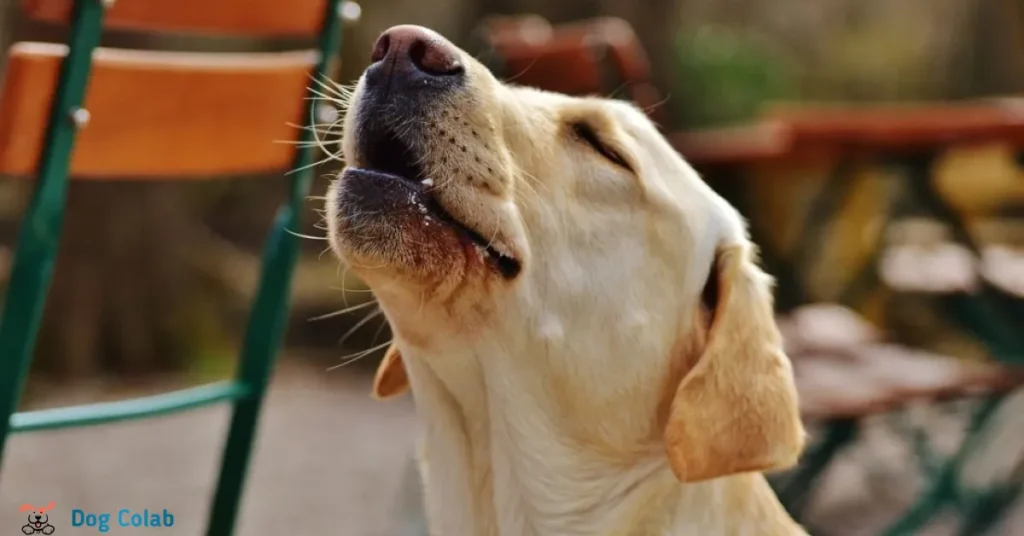
In such cases, it’s a good idea to consult with a veterinarian to rule out any health problems and discuss ways to ensure your dog is comfortable and content during their sleep.
What Dog Howls the Most?
The propensity for howling in their sleep can vary among individual dogs and breeds, and there isn’t a specific breed that universally howls more than others during sleep. Howling during sleep is a behavior that can be influenced by a dog’s personality, experiences, and even genetics. Some dogs are simply more vocal or prone to making noises during their dreams.
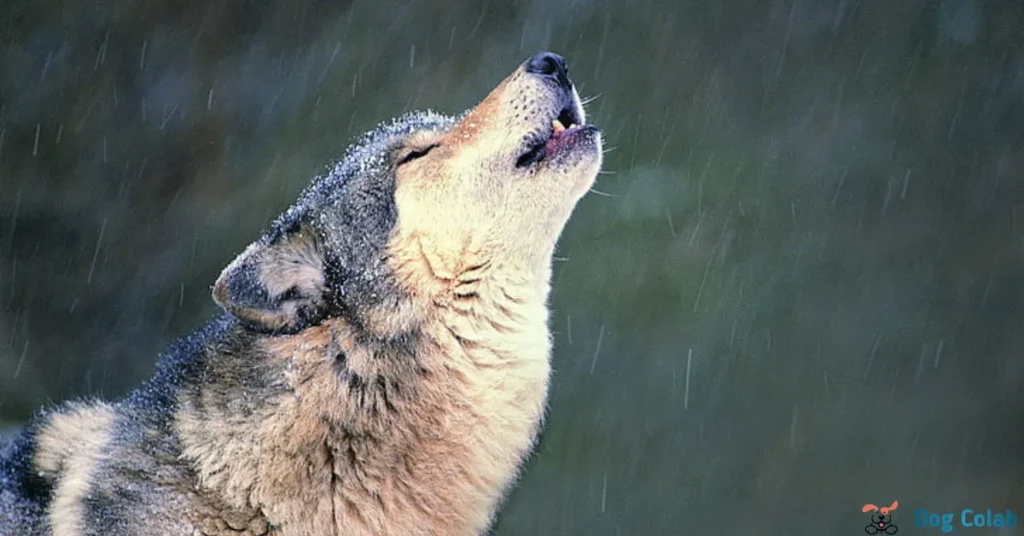
That said, certain breeds are known for their vocal tendencies, and this might extend to howling in their sleep as well. Breeds like Siberian Huskies, Alaskan Malamutes, and Beagles, for instance, are often more vocal compared to others. However, it’s essential to remember that each dog is unique, and even within a breed, individual differences in behavior can be significant.
Recommended Also Read:- Why my dog kicks me when lying down.
Why Do Dogs Cry In Their Sleep?
A dog suddenly started howling in his sleep or crying in their sleep for several reasons.
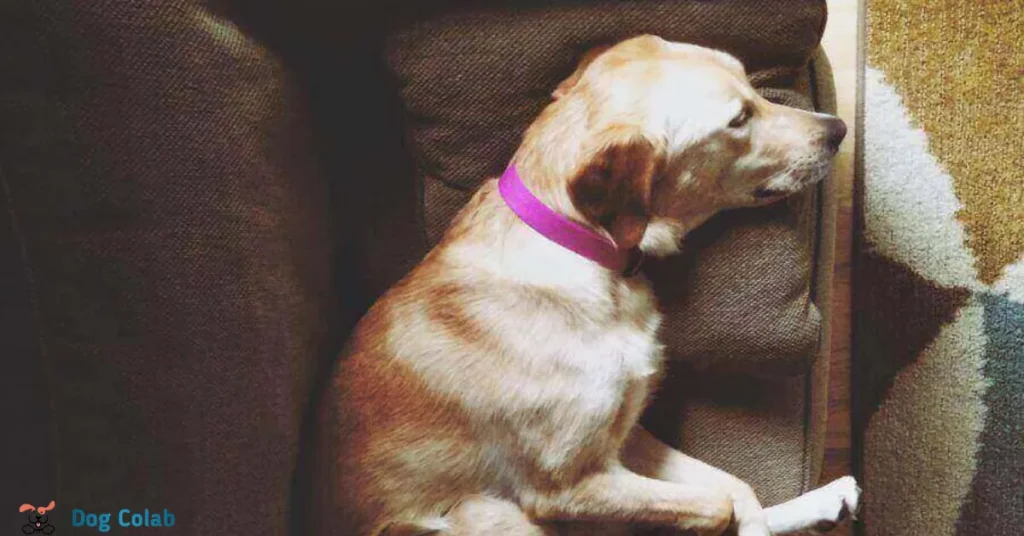
1. Dreaming
Dogs may be dreaming about various activities, people, or animals, and these dreams can lead to vocalizations, including crying or whimpering.
2. Physical Discomfort
Sometimes, a dog’s sleep may be disrupted by physical discomfort, such as muscle cramps, digestive issues, or discomfort from an injury. This discomfort can lead to crying or whining during sleep.
3. Emotional Responses
Dogs can also experience emotions in their dreams. If they’re feeling anxious, scared, or stressed in their dream, they may cry or whimper as a response to those emotions.
4. Attention-Seeking
Some dogs may cry in their sleep to get attention or to be let out of their crate or sleeping area. This is more common in puppies or dogs that haven’t been properly trained.
How To Stop Dog Howling In Sleep?
If your dog’s howling in their sleep is becoming a concern, there are several steps you can take to help reduce or stop this dog behavior.
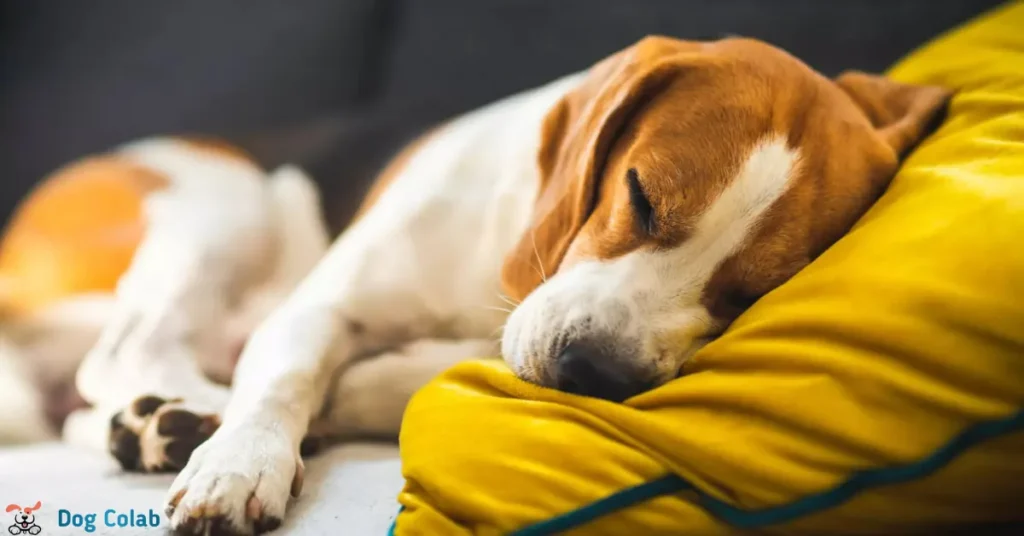
- Ensure Physical Comfort: Make sure your dog is comfortable during sleep. Ensure they have a soft and comfortable bed, and check for any physical discomfort, such as joint pain or digestive issues, that might be causing the howling.
- Establish a Routine: Dogs thrive on routines. Try to establish a consistent sleep schedule for your dog, including regular bedtime and wake-up times. This can help regulate their sleep patterns and reduce the likelihood of disturbed sleep and howling.
- Physical Exercise: Make sure your dog gets enough physical exercise during the day. A tired dog is more likely to sleep soundly without disruptions.
- Mental Stimulation: Mental stimulation is equally important. Provide puzzle toys or engage in training sessions to tire your dog mentally, which can help them sleep better.
- Bedtime Ritual: Establish a calming bedtime ritual for your dog to signal that it’s time to sleep. This can include activities like a short walk, quiet playtime, or a bedtime treat.
- Limit Stimuli: Reduce exposure to stimuli that might trigger howling during sleep. For example, if your dog is sensitive to outside noises, consider using white noise or closing windows to muffle sounds.
- Consult a Veterinarian: If your dog’s howling during sleep persists or seems to be linked to physical discomfort, anxiety, or other issues, consult with a veterinarian. They can assess your dog’s health and behavior and provide appropriate recommendations or treatments.
- Training: If the howling is related to behavioral issues, consider training or working with a professional dog trainer or behaviorist to address the problem. They can provide guidance on behavior modification techniques.
Recommended Also Read:- Why dogs like to sleep alone.
Conclusion “What Does It Mean When Dogs Howl In Their Sleep”
Your dogs howling in their sleep for various reasons. It’s usually a normal behavior, much like humans talking or moving in their sleep. Dogs dream, and these dreams can trigger vocalizations like howling. Sometimes, it’s just a natural part of their sleep cycle.
However, if the howling is frequent or seems distressing, it’s a good idea to pay attention to your dog’s overall well-being. Ensure their comfort, establish routines, and consult with a veterinarian if needed.
In most cases, a little howling during sleep is nothing to worry about and is just your furry friend expressing themselves in their dreams.
NOTE:- More information can be found by clicking this link.
FAQs
1. Why does my dog make weird noises when he sleeps?
Your dog making weird noises while sleeping is likely due to being in the REM (rapid eye movement) stage of deep sleep, similar to humans sleep-talking.
2. Do dogs dream about their owners?
Yes, dogs are likely to dream about their owners since they are deeply attached to them. Their sleep patterns are similar to humans, suggesting they may dream of their owners’ faces, scents, and interactions.
3. Should I wake my dog if he having a nightmare?
No, it’s best not to wake your dog if they’re having a nightmare. Disturbing them could startle them, and it’s safer to let them naturally wake up from the dream on their own.
4. What to do when dogs howl at night?
To address nighttime howling in dogs, it’s best to ignore the behavior and teach commands like “Speak” and “Quiet” to promote silence as a desired response.

Can a dog’s howling in their sleep be a sign of happiness or contentment, or does it indicate a deeper emotional issue that needs to be addressed?